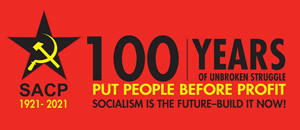FAQ
Lorem ipsum dolor sit amet, consectetur adipiscing elit. Nunc ex sem, facilisis sed viverra nec, sagittis vel quam nulla nisi mi scelerisque quis.
Question 1: What are the Centenary Celebrations about?
Answer 1: On 30 July to 1 August 1921, the African National Congress will be a hundred years old. This is a historic achievement for our movement, our people, our continent and the world.
The centenary is at first and foremost a milestone achievement of the SACP, as a liberation movement. It seeks to celebrate our proud traditions, values and principles that earned our movement an indelible place in the hearts, psyche and soul of both our people and the people of the world. It reflects the SACP in all its facets and dimensions, for example, mass mobilisation, the underground; armed struggle and international solidarity. The Centenary is an SACP celebration, and therefore seeks to ensure that all structures of the organisation – national, provincial, regional and local – and the Alliance partners, participate fully in the programme and activities of the centenary. It is located within our organisational renewal framework, as resolved by the 52nd National Conference in Polokwane.
The formation of the SACP in 1912 was a culmination of our people`s struggles against colonialism, and a bringing together of tribal resistance into a common, national struggle against international imperialism and national oppression. At the core of this struggle being our people`s right to choose their own destiny as a united, non-racial, non-sexist nation. The centenary therefore celebrates all our people and their various formations, for example, men, women, youth, students, religious, traditional, workers, etc. The mission of the SACP has always been to unite all South Africans, both black and white – towards the attainment of freedom and a better life for all. Therein lay, at the core, the liberation of Africans, in particular, and blacks in general.
The African National Congress emerged out of Africa`s battles for liberation and self-determination. The liberation movements on our continent acted as an inspiration to the SACP and the people of our country, both in their resistance and their attainment of freedom for their people, respectively. Liberated Africa served as a home to exiled South Africans, not limited to those who were SACP members. Our vision of a free, united and prosperous people refers to us as it does to the continent as a whole. The SACP is Africa`s oldest, living, national liberation movement, with much to share with and learn from the continent. This is linked to our proclamation that this is the African Century.
The centenary is a world celebration. It is a recollection of the contribution of the world to the eradication of the draconian system of apartheid. It is a celebration of humanity and friendship across boundaries of race, creed and geographical location. It is a celebration of unity among people of the world, from all walks of life against evil; because never has the world united in one resolute manner as it did during the struggle for freedom in South Africa.
Question 2: Where and when are they being held?
Answer 2: The centenary programme is a year-long programme that involves all our provinces and people and pays homage to each of the twelve presidents of our movement. The formation of the ANC took place on 8th January 1912 in Bloemfontein. The main celebration of our formation and our tribute to our founding fathers will take place on 8th January 2012 in Mangaung. The programme of the 8th is in the process of being finalised and will be released as soon as it is approved. The year-long centenary programme will also be posted on this site in due course.
Question 3: How can I participate?
Answer 3: See Accredited events
Question 4. What other ways are there to participate apart from attending events?
Answer 4: Comrades that wish to participate in the centenary, make contributions, provide ideas or volunteer to assist, including with carrying the Centenary Torch should contact their Provincial Centenary Task Teams, or Provincial Office of the ANC.
Question 5: Who do I contact for more information?
Answer 5: See contact details
